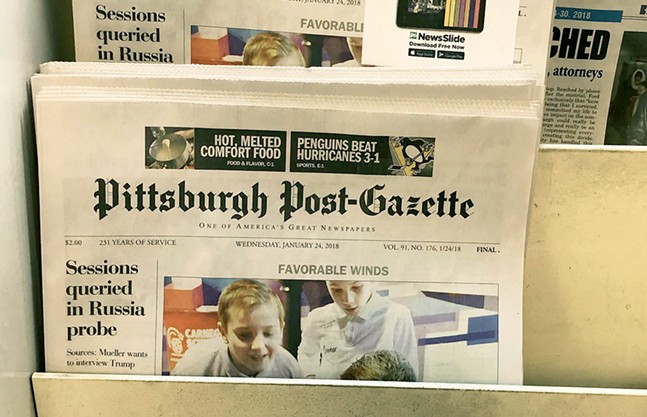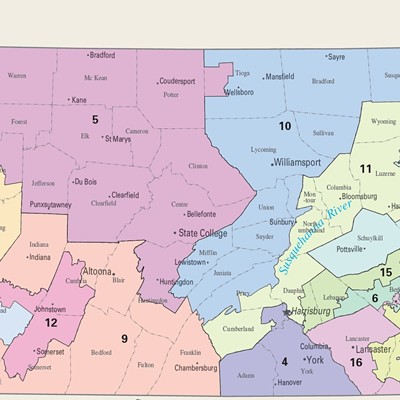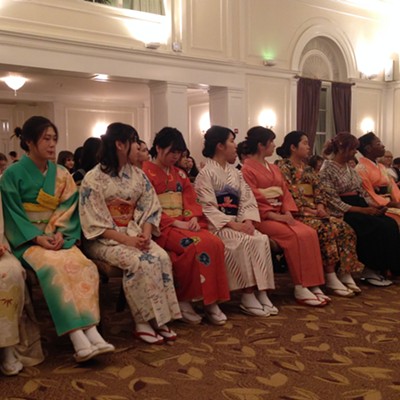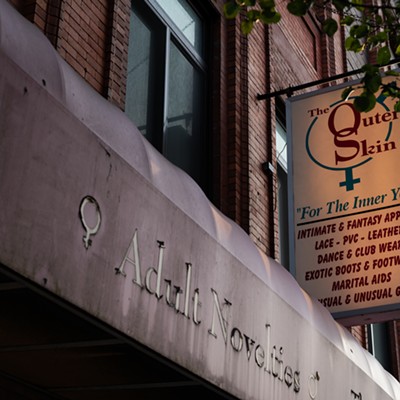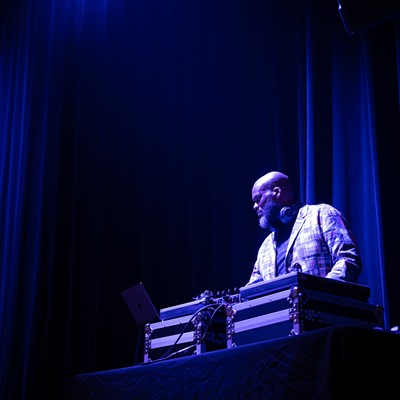Wednesday, January 24, 2018
Pittsburgh Post-Gazette employees plan byline strike Thursday to protest stalled contract negotiations with management
In response to stalled contract negotiations and company demands for steep concessions, newsroom employees of the Pittsburgh Post-Gazette will begin a byline strike against management.
Pittsburgh City Paper confirmed the action through several P-G staff members, who wished to remain anonymous. CP also read the email alerting employees of the action.
The Newspaper Guild of Pittsburgh represents reporters, copy editors and photographers at the P-G. Employees with the guild have been working without a contract since March 31, 2017.
Several union members say negotiations have been more difficult this time around because management has refused to move away from many of its initial demands. Those demands have included unlimited use of freelancers and stringers, refusal to pay for additional health-care costs, and a continued wage freeze, which has been ongoing for a decade.
Last week, guild president and P-G reporter Michael Fuoco declined to discuss specifics of the negotiations besides the lack of a pay increase. He did, however, confirm that negotiations are “moving like a glacier.”
“We feel there is one side that is trying to negotiate a contract,” Fuoco said. “That’s us.”
The byline strike — when reporters or photographers hold back their name from their work in protest — is the culmination of a tumultuous few weeks at Pittsburgh’s last remaining print daily.
As first reported by the Pittsburgh Business Times, the union filed charges Jan. 5 with the National Labor Relations Board alleging that the P-G was violating the guild’s old contract, which still covers the 150 employees as the union negotiates a new deal.
The charges stem from the P-G refusing to pay for an increase in the cost of the employee’s health-care plan, according to the NLRB document obtained by CP. The union contends the P-G not paying will lead to dropped health coverage.
“We didn’t do it lightly,” Fuoco said. “We cannot stand idly by when they violate federal law, and if they do something else, we’ll file another.”
The strike also comes as the newspaper’s staff openly clashed with its publisher and editor-in-chief, John Robinson Block, over a racially charged editorial defending President Donald Trump’s “shithole” comments about African and Caribbean nations. The editorial also drew flak from former employees, local foundations and activists, as well as the guild. CP also reported on comments Block made in his other paper, the Toledo Blade, saying people of color needed to pull themselves up “by the bootstraps.”
According to Tim Schick, administrative director of the National Newspaper Guild, based in Washington, D.C., byline strikes have historically been used to help push a recalcitrant publisher to the table not by stopping production of the paper, but by showing that the power at a paper lies with the journalists.
“Newspaper publishers hate them because it demonstrates they don’t have control over what goes into their paper,” Schick says.
Block Communications Inc., the parent company of the P-G, did not reply to multiple requests for comment.
The acrimony during contract talks hasn’t been helped by the P-G ownership's choice in negotiators, Nashville-based law firm King and Ballow. The firm has extensive experience in negotiating contracts with newspapers that goes back for decades.
The firm, founded in the late 1960s, has developed a reputation over the years, among reporters, photographers and other employees at America’s dailies, for its precision in negotiating favorable contracts for management and, at times, for busting newspaper unions.
Formed in 1969, King and Ballow already had enough of a reputation by 1990 to warrant a United Press International story on its success in decertifying unions at publications like the Houston Chronicle and Wilkes-Barre Times Leader. According to a UPI story, the then-president of the Newspaper Guild of New York said King and Ballow are “not hired to negotiate. They're hired to bust unions.”
Its run doesn’t end there, however, as reports of King and Ballow breaking up unionized newsrooms appear everywhere from the St. Louis suburbs and San Francisco to the New York Daily News over the past two decades.
When reached, a King and Ballow employee said, “We’re not going to respond to this kind of thing.”
But most worrisome for P-G employees, King and Ballow helped negotiate for the Blocks at the Toledo Blade in 2006 — negotiations that resulted in a months-long lockout that the NLRB found illegal.
“We were a little surprised [by the hire] given their history,” Fuoco said.
Mike Duff, a former Teamster, Harvard Law grad, NLRB negotiator and now labor-law professor at the University of Wyoming, has seen contract negotiations from many different angles. He says the longer negotiations stretch on, the worse it usually ends up for the unions.
Often, what firms like King and Ballow become known for is drawing out negotiations to demoralize the union, he says. And even if that doesn’t seem like “good faith” bargaining, under federal law, it is completely legal.
“If you stopped the person on the street and asked them if you bargained in good faith, they’d say no, yet the law would allow them to do that,” Duff says.
It was such tactics that Steven Murphy, a then-19-year veteran of the Toledo Blade’s newsroom and a member of the Blade’s negotiating committee, encountered in the mid-aughts.
Now 53 and still working in journalism, Murphy, a Pittsburgh native, said King and Ballow’s involvement signaled a complete switch in negotiating tactics. While previously Murphy could at least expect professional respect in the negotiating room, he says the Block’s new attorneys were disrespectful, belligerent and demeaning.
Instead of working from common ground, King and Ballow’s lawyers turned every benefit and pay raise the Blade’s employees had ever received against Murphy and the other negotiators.
“They accused us and the other unions of running the company into the ground,” Murphy says.
Armed with a totally rewritten contract, King and Ballow immediately started demanding major concessions: Sales staff would be paid entirely on commission; there would be pay cuts for the rest of the staff; management would pass off more benefit costs onto the workers; and the paper would gain unlimited use of freelancers and stringers.
P-G employees have confirmed many of those demands match current demands in their negotiations — except for the commission demands, because the guild does not cover the paper’s ad reps.
When such tactics went nowhere, the Blade locked out non-editorial union employees, including delivery drivers, typesetters and others, from August 2006 to May 2007.
While the NLRB later found the lockout illegal, the pressure still seemed to work when the employees agreed to a new contract. It included wage cuts, a longer workday, fewer days off, and commission pay for ad reps, according to a Blade article. The company also had $5 million on owed back pay for locked-out workers reduced to $3.5 million.
For Murphy, the Blade negotiations forced a personal decision — he left Toledo for a new job in February 2007, citing a lack of faith in the future.
“It seemed clear to us and negotiations [with] other unions, that the company wasn’t interested in a fair contract,” Murphy says. “We believed they wanted a confrontation.”
And for his part, Fuoco, while leaving all options open, is still defiant.
“They think we make widgets — we do not make widgets,” Fuoco said. “We are people with a skill set. Without us, there is no Post-Gazette.”
Pittsburgh City Paper confirmed the action through several P-G staff members, who wished to remain anonymous. CP also read the email alerting employees of the action.
The Newspaper Guild of Pittsburgh represents reporters, copy editors and photographers at the P-G. Employees with the guild have been working without a contract since March 31, 2017.
Several union members say negotiations have been more difficult this time around because management has refused to move away from many of its initial demands. Those demands have included unlimited use of freelancers and stringers, refusal to pay for additional health-care costs, and a continued wage freeze, which has been ongoing for a decade.
Last week, guild president and P-G reporter Michael Fuoco declined to discuss specifics of the negotiations besides the lack of a pay increase. He did, however, confirm that negotiations are “moving like a glacier.”
“We feel there is one side that is trying to negotiate a contract,” Fuoco said. “That’s us.”
The byline strike — when reporters or photographers hold back their name from their work in protest — is the culmination of a tumultuous few weeks at Pittsburgh’s last remaining print daily.
As first reported by the Pittsburgh Business Times, the union filed charges Jan. 5 with the National Labor Relations Board alleging that the P-G was violating the guild’s old contract, which still covers the 150 employees as the union negotiates a new deal.
The charges stem from the P-G refusing to pay for an increase in the cost of the employee’s health-care plan, according to the NLRB document obtained by CP. The union contends the P-G not paying will lead to dropped health coverage.
“We didn’t do it lightly,” Fuoco said. “We cannot stand idly by when they violate federal law, and if they do something else, we’ll file another.”
The strike also comes as the newspaper’s staff openly clashed with its publisher and editor-in-chief, John Robinson Block, over a racially charged editorial defending President Donald Trump’s “shithole” comments about African and Caribbean nations. The editorial also drew flak from former employees, local foundations and activists, as well as the guild. CP also reported on comments Block made in his other paper, the Toledo Blade, saying people of color needed to pull themselves up “by the bootstraps.”
According to Tim Schick, administrative director of the National Newspaper Guild, based in Washington, D.C., byline strikes have historically been used to help push a recalcitrant publisher to the table not by stopping production of the paper, but by showing that the power at a paper lies with the journalists.
“Newspaper publishers hate them because it demonstrates they don’t have control over what goes into their paper,” Schick says.
Block Communications Inc., the parent company of the P-G, did not reply to multiple requests for comment.
The acrimony during contract talks hasn’t been helped by the P-G ownership's choice in negotiators, Nashville-based law firm King and Ballow. The firm has extensive experience in negotiating contracts with newspapers that goes back for decades.
The firm, founded in the late 1960s, has developed a reputation over the years, among reporters, photographers and other employees at America’s dailies, for its precision in negotiating favorable contracts for management and, at times, for busting newspaper unions.
Formed in 1969, King and Ballow already had enough of a reputation by 1990 to warrant a United Press International story on its success in decertifying unions at publications like the Houston Chronicle and Wilkes-Barre Times Leader. According to a UPI story, the then-president of the Newspaper Guild of New York said King and Ballow are “not hired to negotiate. They're hired to bust unions.”
Its run doesn’t end there, however, as reports of King and Ballow breaking up unionized newsrooms appear everywhere from the St. Louis suburbs and San Francisco to the New York Daily News over the past two decades.
When reached, a King and Ballow employee said, “We’re not going to respond to this kind of thing.”
But most worrisome for P-G employees, King and Ballow helped negotiate for the Blocks at the Toledo Blade in 2006 — negotiations that resulted in a months-long lockout that the NLRB found illegal.
“We were a little surprised [by the hire] given their history,” Fuoco said.
Mike Duff, a former Teamster, Harvard Law grad, NLRB negotiator and now labor-law professor at the University of Wyoming, has seen contract negotiations from many different angles. He says the longer negotiations stretch on, the worse it usually ends up for the unions.
Often, what firms like King and Ballow become known for is drawing out negotiations to demoralize the union, he says. And even if that doesn’t seem like “good faith” bargaining, under federal law, it is completely legal.
“If you stopped the person on the street and asked them if you bargained in good faith, they’d say no, yet the law would allow them to do that,” Duff says.
It was such tactics that Steven Murphy, a then-19-year veteran of the Toledo Blade’s newsroom and a member of the Blade’s negotiating committee, encountered in the mid-aughts.
Now 53 and still working in journalism, Murphy, a Pittsburgh native, said King and Ballow’s involvement signaled a complete switch in negotiating tactics. While previously Murphy could at least expect professional respect in the negotiating room, he says the Block’s new attorneys were disrespectful, belligerent and demeaning.
Instead of working from common ground, King and Ballow’s lawyers turned every benefit and pay raise the Blade’s employees had ever received against Murphy and the other negotiators.
“They accused us and the other unions of running the company into the ground,” Murphy says.
Armed with a totally rewritten contract, King and Ballow immediately started demanding major concessions: Sales staff would be paid entirely on commission; there would be pay cuts for the rest of the staff; management would pass off more benefit costs onto the workers; and the paper would gain unlimited use of freelancers and stringers.
P-G employees have confirmed many of those demands match current demands in their negotiations — except for the commission demands, because the guild does not cover the paper’s ad reps.
When such tactics went nowhere, the Blade locked out non-editorial union employees, including delivery drivers, typesetters and others, from August 2006 to May 2007.
While the NLRB later found the lockout illegal, the pressure still seemed to work when the employees agreed to a new contract. It included wage cuts, a longer workday, fewer days off, and commission pay for ad reps, according to a Blade article. The company also had $5 million on owed back pay for locked-out workers reduced to $3.5 million.
For Murphy, the Blade negotiations forced a personal decision — he left Toledo for a new job in February 2007, citing a lack of faith in the future.
“It seemed clear to us and negotiations [with] other unions, that the company wasn’t interested in a fair contract,” Murphy says. “We believed they wanted a confrontation.”
And for his part, Fuoco, while leaving all options open, is still defiant.
“They think we make widgets — we do not make widgets,” Fuoco said. “We are people with a skill set. Without us, there is no Post-Gazette.”
Tags: Pittsburgh Post-Gazette , John Robinson Block , union , strike , Toledo Blade , National Newspaper Guild , National Labor Relations Board , Michael Fuoco , Mike Duff , Steven Murphy , Image


